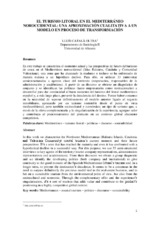Mostrar el registro sencillo del ítem
El turismo litoral en el Mediterráneo noroccidental: una aproximación cualitativa a un modelo en proceso de transformación
| dc.contributor.author | Català Oltra, Lluís | |
| dc.date.accessioned | 2018-10-16T07:56:06Z | |
| dc.date.available | 2018-10-16T07:56:06Z | |
| dc.date.issued | 2018 | |
| dc.identifier.issn | 2530-7134 | |
| dc.identifier.uri | http://hdl.handle.net/10396/17284 | |
| dc.description.abstract | En este trabajo se caracteriza el momento actual y las perspectivas de futuro del turismo de costa en el Mediterráneo noroccidental (Islas Baleares, Cataluña y Comunidad Valenciana), una zona que ha alcanzado la madurez e incluso se ha enfrentado de manera exitosa a un hipotético declive. Para ello, se utilizan 33 entrevistas semiestructuradas a agentes clave del territorio (empresarios, responsables de la administración y académicos). A partir de su discurso se obtiene un diagnóstico de conjunto y se identifican las políticas (tanto empresariales como institucionales) a desarrollar para dar continuidad al buen momento del turismo del litoral mediterráneo español y, a más largo plazo, prevenir la decadencia del destino. Parece haber consenso en la necesidad de superar definitivamente el modelo anterior ligado al negocio inmobiliario, apostando por un turismo sostenible desde el punto de vista medioambiental, pero también sociocultural y económico; un tipo de turismo que, a través de la oferta complementaria y la singularización de la experiencia, agregue valor y contribuya al posicionamiento del producto en un contexto global altamente competitivo. | es_ES |
| dc.description.abstract | In this work we characterise the Northwest Mediterranean (Balearic Islands, Catalonia and Valencian Community) coastal tourism’s current moment and their future perspectives. It’s a zone that has reached the maturity and even it has confronted with a hypothetical decline in a successful way. For this purpose, we use 33 semi-structured interviews to key agents of the territory (tourist company representatives, administration representatives and academicians). From their discourse we obtain a group diagnostic and we identify the developing politics (both company and institutional) to give continuity to the good moment of the Spanish Mediterranean littoral’s tourism and, in a longer term, to prevent the destination’s decadence. It seems to be a consensus in the need to surpass definitively the previous model tied to the real-estate business, and to bet on a sustainable tourism from the environmental point of view, but also from the sociocultural and economic. Through the complementary offer and the experience’s singularization, it’s a sort of tourism that adds value and contribute to the product’s positioning in a highly competitive global context. | es_ES |
| dc.format.mimetype | application/pdf | es_ES |
| dc.language.iso | spa | es_ES |
| dc.publisher | UCOPress | es_ES |
| dc.rights | https://creativecommons.org/licenses/by-nc/4.0/ | es_ES |
| dc.source | Revista Internacional de Turismo, Empresa y Territorio (RITUREM) 2(1), 1-19 (2018) | es_ES |
| dc.subject | Mediterráneo | es_ES |
| dc.subject | Turismo litoral | es_ES |
| dc.subject | Políticas | es_ES |
| dc.subject | Discurso | es_ES |
| dc.subject | Sostenibilidad | es_ES |
| dc.subject | Mediterranean | es_ES |
| dc.subject | Coastal tourism | es_ES |
| dc.subject | Politics | es_ES |
| dc.subject | Discourse | es_ES |
| dc.subject | Sustainability | es_ES |
| dc.title | El turismo litoral en el Mediterráneo noroccidental: una aproximación cualitativa a un modelo en proceso de transformación | es_ES |
| dc.type | info:eu-repo/semantics/article | es_ES |
| dc.relation.publisherversion | http://www.uco.es/ucopress/ojs/index.php/riturem/index | es_ES |
| dc.rights.accessRights | info:eu-repo/semantics/openAccess | es_ES |

